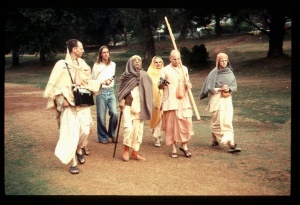SB 6.15.5

A.C. Bhaktivedanta Swami Prabhupada
TEXT 5
- vayaṁ ca tvaṁ ca ye ceme
- tulya-kālāś carācarāḥ
- janma-mṛtyor yathā paścāt
- prāṅ naivam adhunāpi bhoḥ
SYNONYMS
vayam — we (the great sages and the ministers and adherents of the King); ca — and; tvam — you; ca — also; ye — who; ca — also; ime — these; tulya-kālāḥ — assembled at the same time; cara-acarāḥ — moving and not moving; janma — birth; mṛtyoḥ — and death; yathā — just as; paścāt — after; prāk — before; na — not; evam — thus; adhunā — at present; api — although; bhoḥ — O King.
TRANSLATION
O King, both you and we—your advisers, wives and ministers—as well as everything moving and not moving throughout the entire cosmos at this time, are in a temporary situation. Before our birth this situation did not exist, and after our death it will exist no longer. Therefore our situation now is temporary, although it is not false.
PURPORT
The Māyāvādī philosophers say, brahma satyaṁ jagan mithyā: Brahman, the living being, is factual, but his present bodily situation is false. According to the Vaiṣṇava philosophy, however, the present situation is not false but temporary. It is like a dream. A dream does not exist before one falls asleep, nor does it continue after one awakens. The period for dreaming exists only between these two, and therefore it is false in the sense that it is impermanent. Similarly, the entire material creation, including our own creation and those of others, is impermanent. We do not lament for the situation in a dream before the dream takes place or after it is over, and so during the dream, or during a dreamlike situation, one should not accept it as factual and lament about it. This is real knowledge.